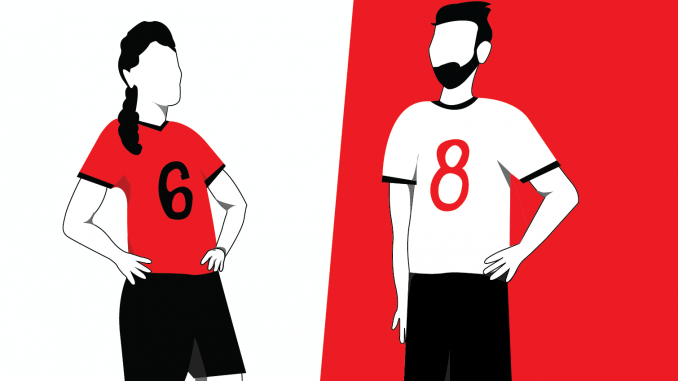

I played competitive softball for 10 years. But as a woman, I still feel the need to prove my athletic ability and knowledge.
Instead of just enjoying, participating or watching, I felt like I had to show others that I was strong, athletic and updated on sports news. I never truly felt like I belonged in the realm of athletics.
I’m not alone in this feeling either. Forty percent of women in the sports industry have experienced discrimination because of their gender, while 72 percent of their male colleagues did not acknowledge that sexism was an issue in their field, according to the non-profit organization Women in Sport.
This is evident at the collegiate sports level, too. Despite how important sports can be to the college experience, many women experienced discrimination in this part of university life because of a monopoly that men believe they have on athletics.
On Sept. 7, Kent State University abruptly ended a field hockey game between Temple University and the University of Maine on their field to prepare for a fireworks show for their football team’s game that same day, The Temple News reported. The action prioritized an unnecessary men’s team celebration over an actual game with female players, and it completely disregarded the time, energy and transportation costs of the players and their families.
Above all else, it was sexist.
Lucy Reed, a senior forward on the field hockey team and a public relations major, said the experience as extremely frustrating and disappointing.
“This is a much bigger issue than any of us had thought,” Reed said. She does, however, appreciate the inclusivity she feels in the athletic department at Temple.
“I think our athletic department does such a good job of making sure that every single athlete knows their value,” she added. “What happened at Kent State, that would never ever happen at Temple.”
As president of the Student-Athlete Advisory Committee of Temple University, Reed has a lot of faith that Temple’s athletic department is there for all athletes, male or female, but this does not change the fact that women in college sports are less appreciated by the Temple student body, she said.
The total attendance of the 2018-19 women’s basketball season was 15,312, according to owlsports.com. The men’s basketball team’s was 93,168 for the same season.
Students need to show out for university sports regardless of gender, and making real change starts with that transition.
“One of the major ways we can all support our teams, specifically our womens’ teams, is to get out to their games and competitions,” said Kristy Bannon Sromovsky, Temple’s senior associate athletics director.
Still, even when attendance for a particular women’s sport is high, female players are treated unfairly.
The U.S. women’s national soccer team, for example, has record-breaking ticket sales, won the World Cup four times and had the most-watched soccer match in U.S. history in 2015, the Wall Street Journal reported. Yet, they are allegedly paid comparatively less than the men’s national team, according to their lawsuit against the U.S. Soccer Federation on March 8.
“We still have those stereotypes today, we still see the [U.S. women’s soccer team] not getting paid the same, and that all affects how we view women in collegiate sports. They’re viewed as less important,” said David Schrider, a sociology professor who teaches the course Sociology of Sports.
“I think it has to do with how we view women’s bodies and how we view their participation in sports throughout history,” he added.
Whether it be the Temple field hockey team or the U.S. women’s soccer team, women’s sports have been routinely discriminated against.
Female athletes work just as hard and are just as dedicated as male athletes, so it is only fair to give them the same treatment, attention and pay.
As women continue to break barriers in athletics, we need to be there to show support and back them up.


Be the first to comment